Charles E W Bean, Diaries, AWM38 3DRL 606/276/1 - 1928-1937 - Part 8
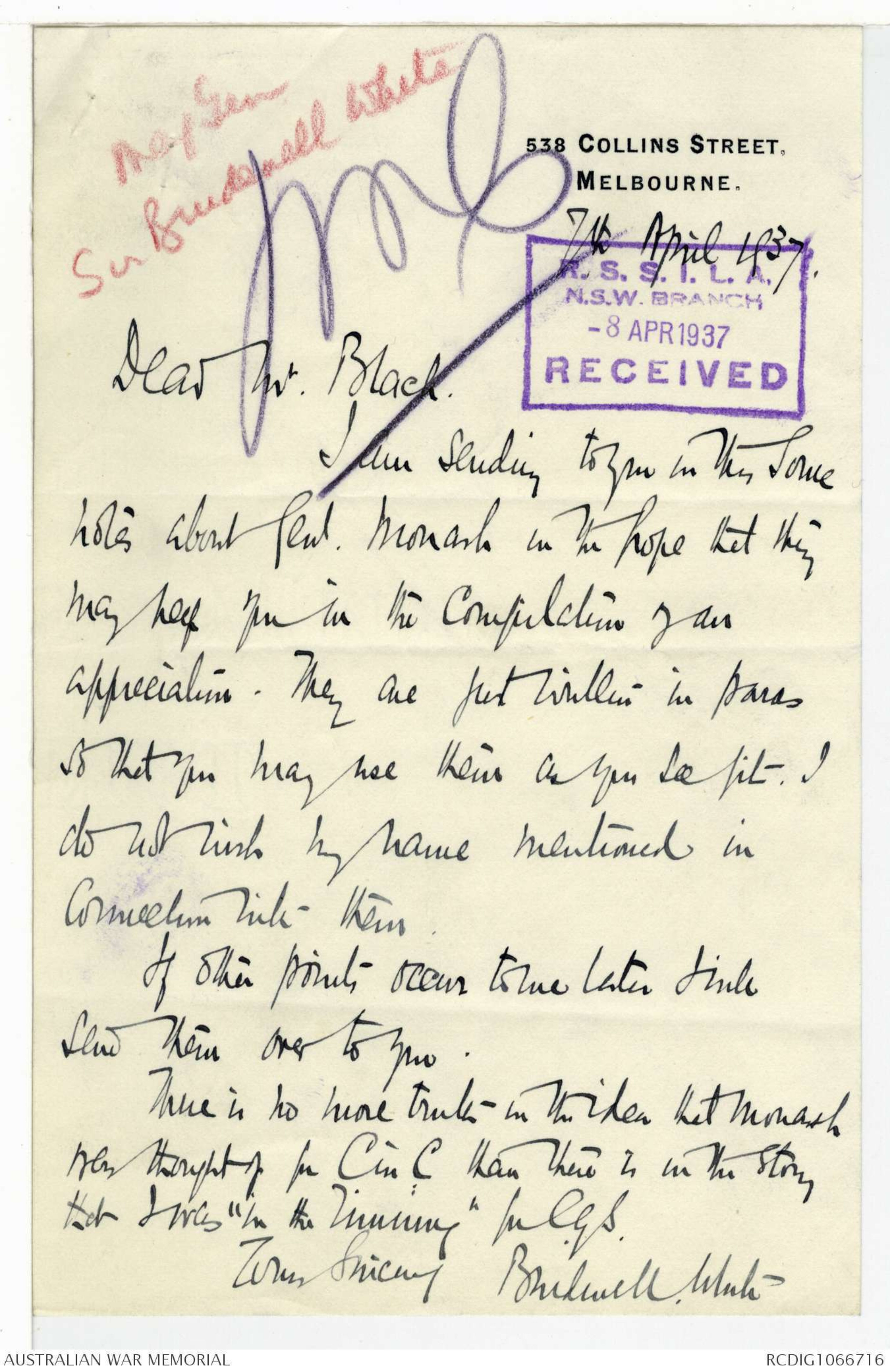
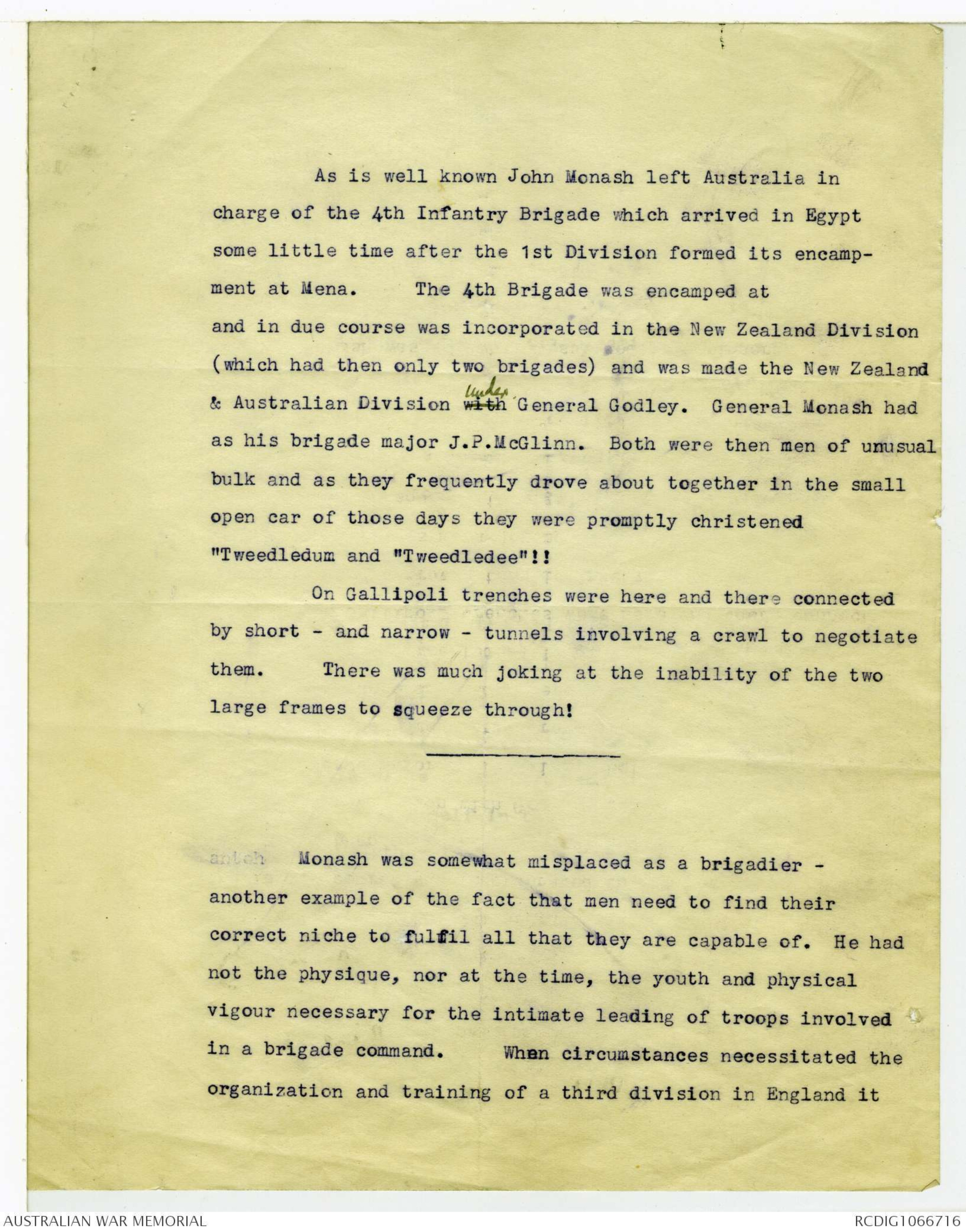
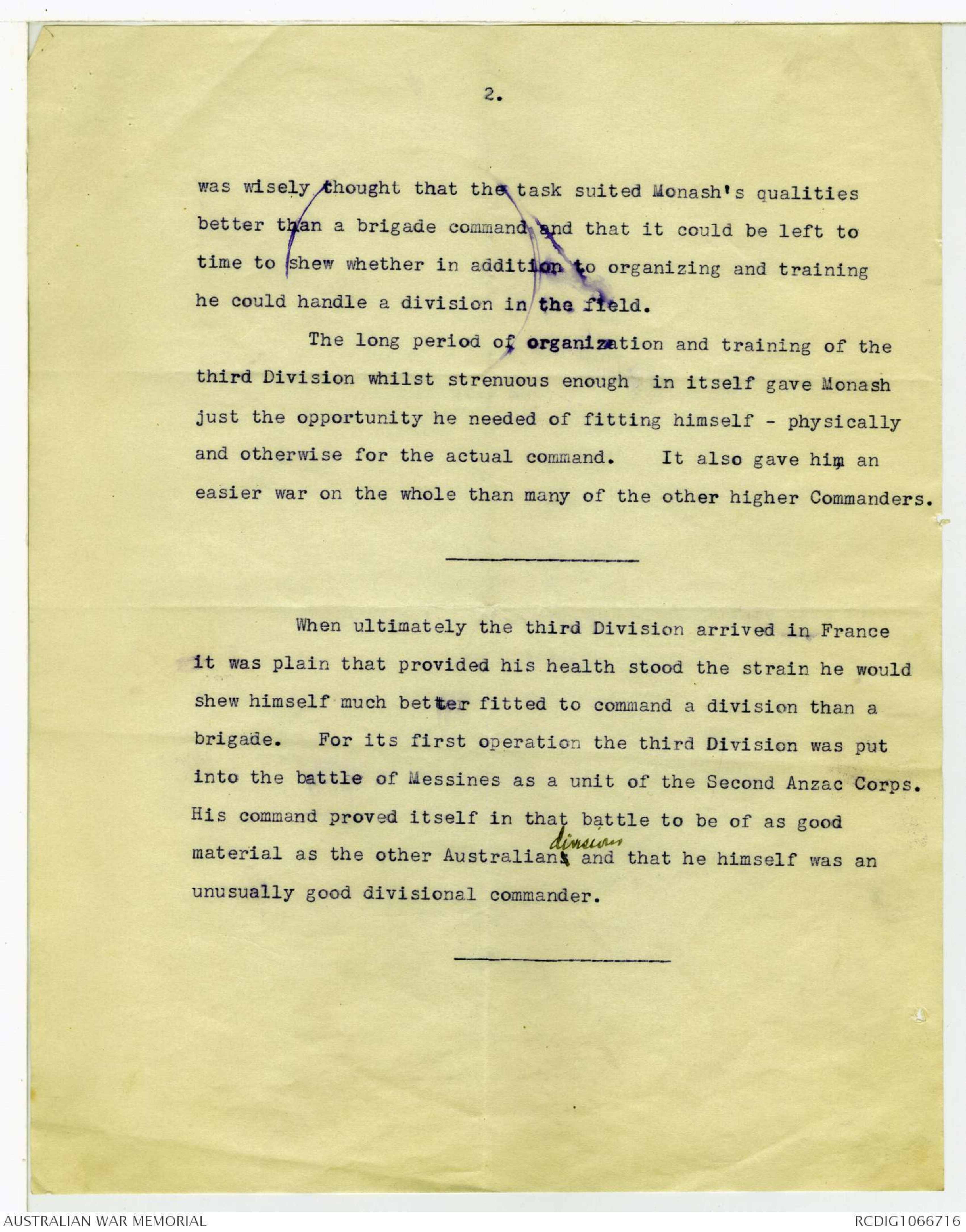
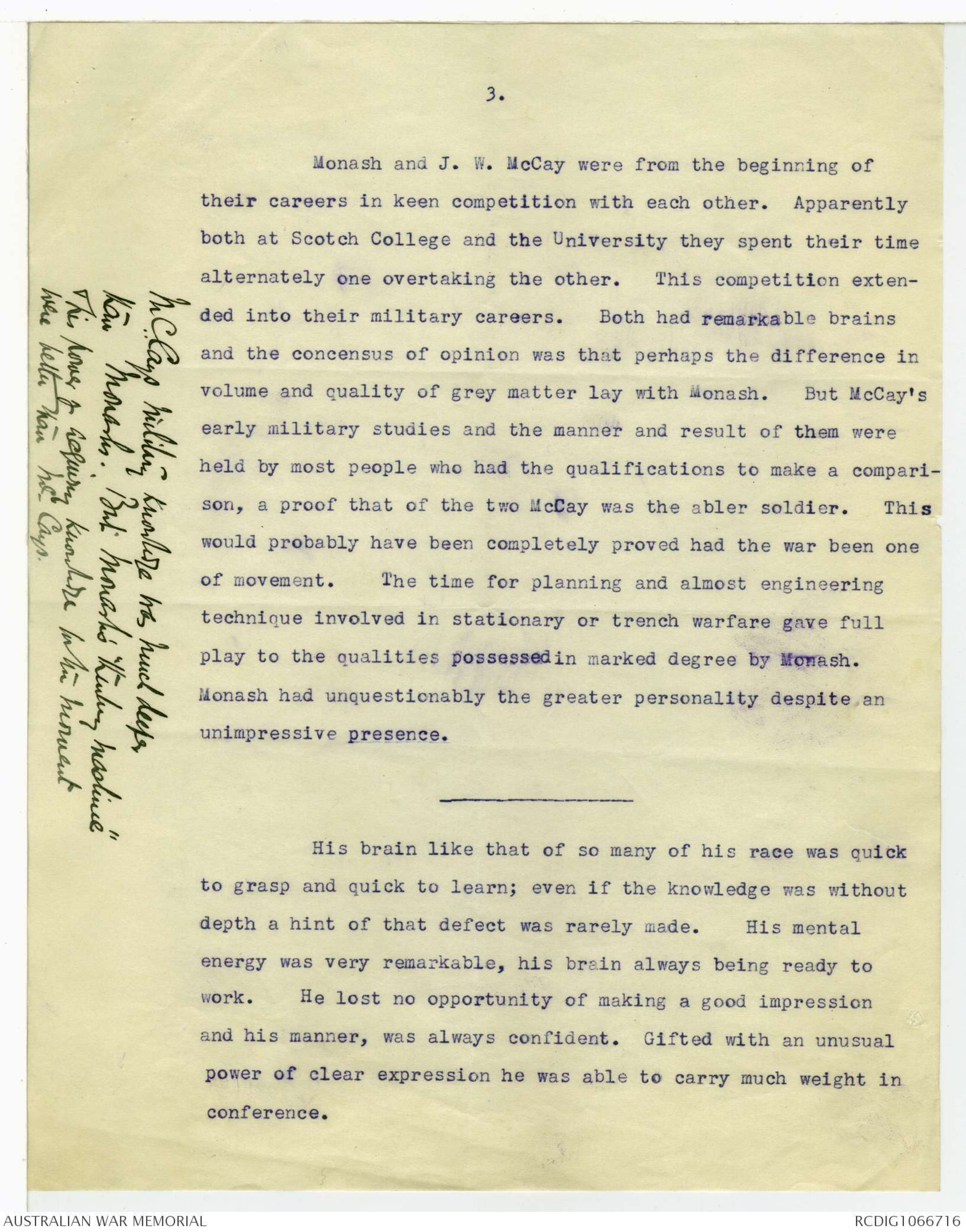
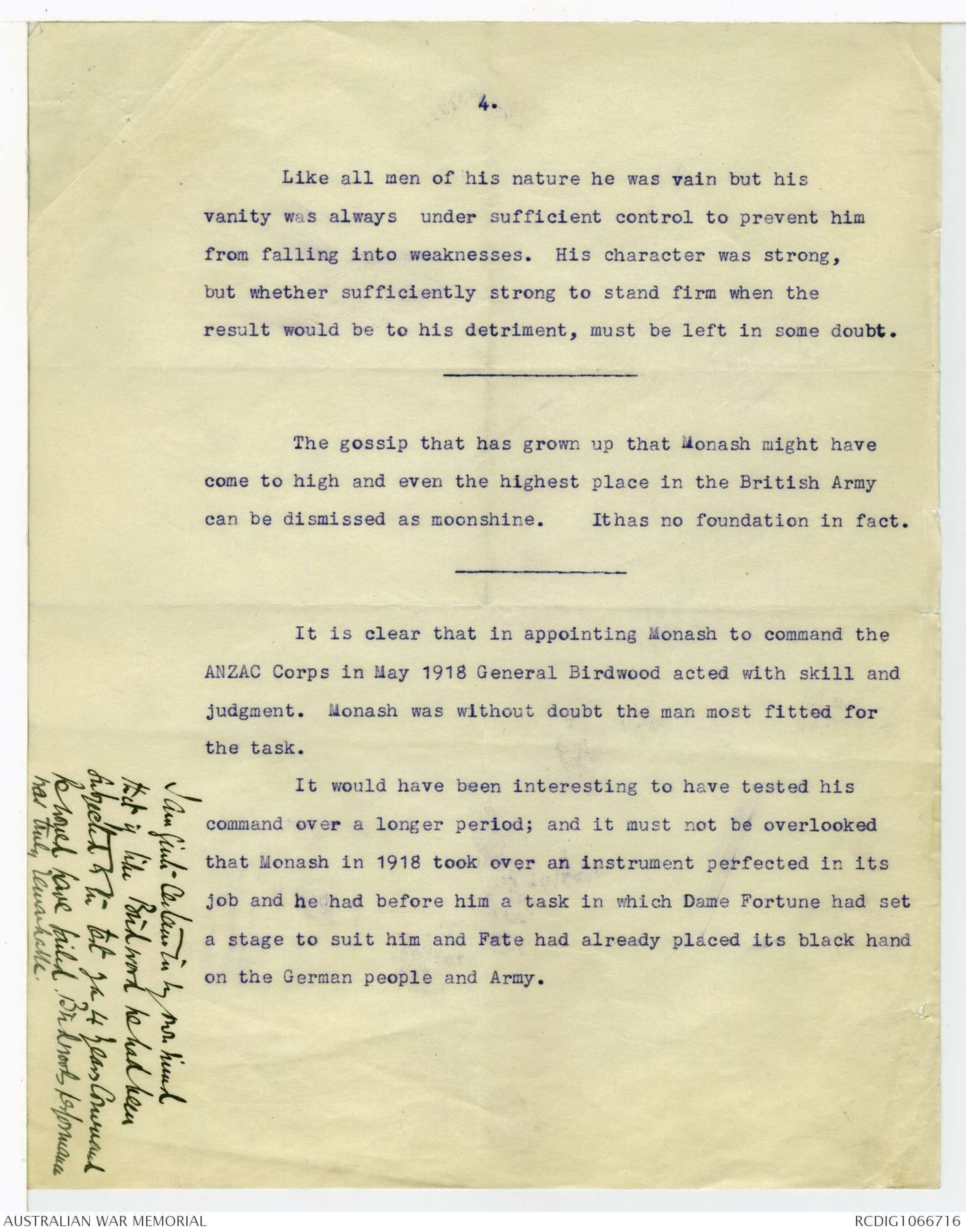
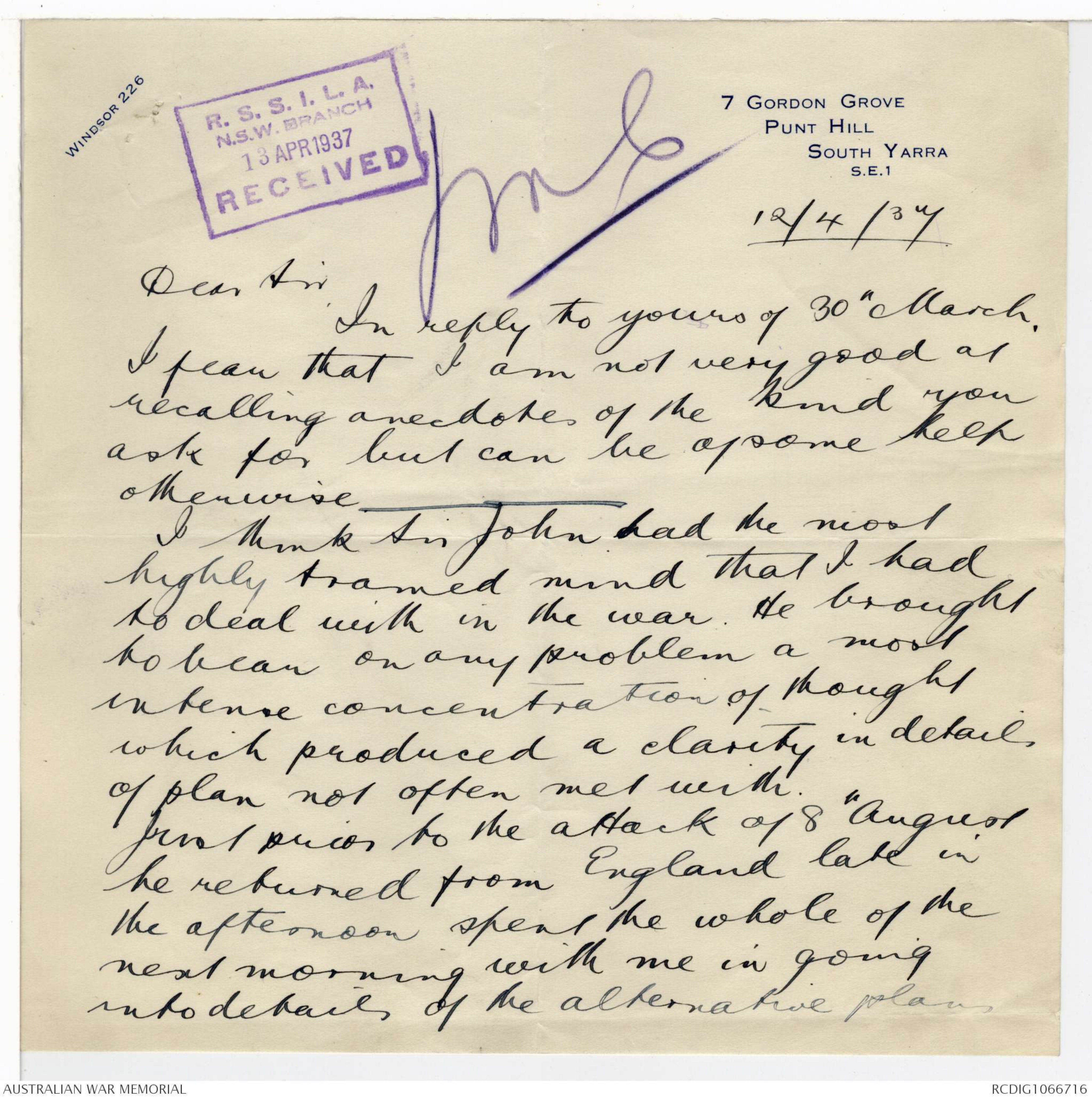
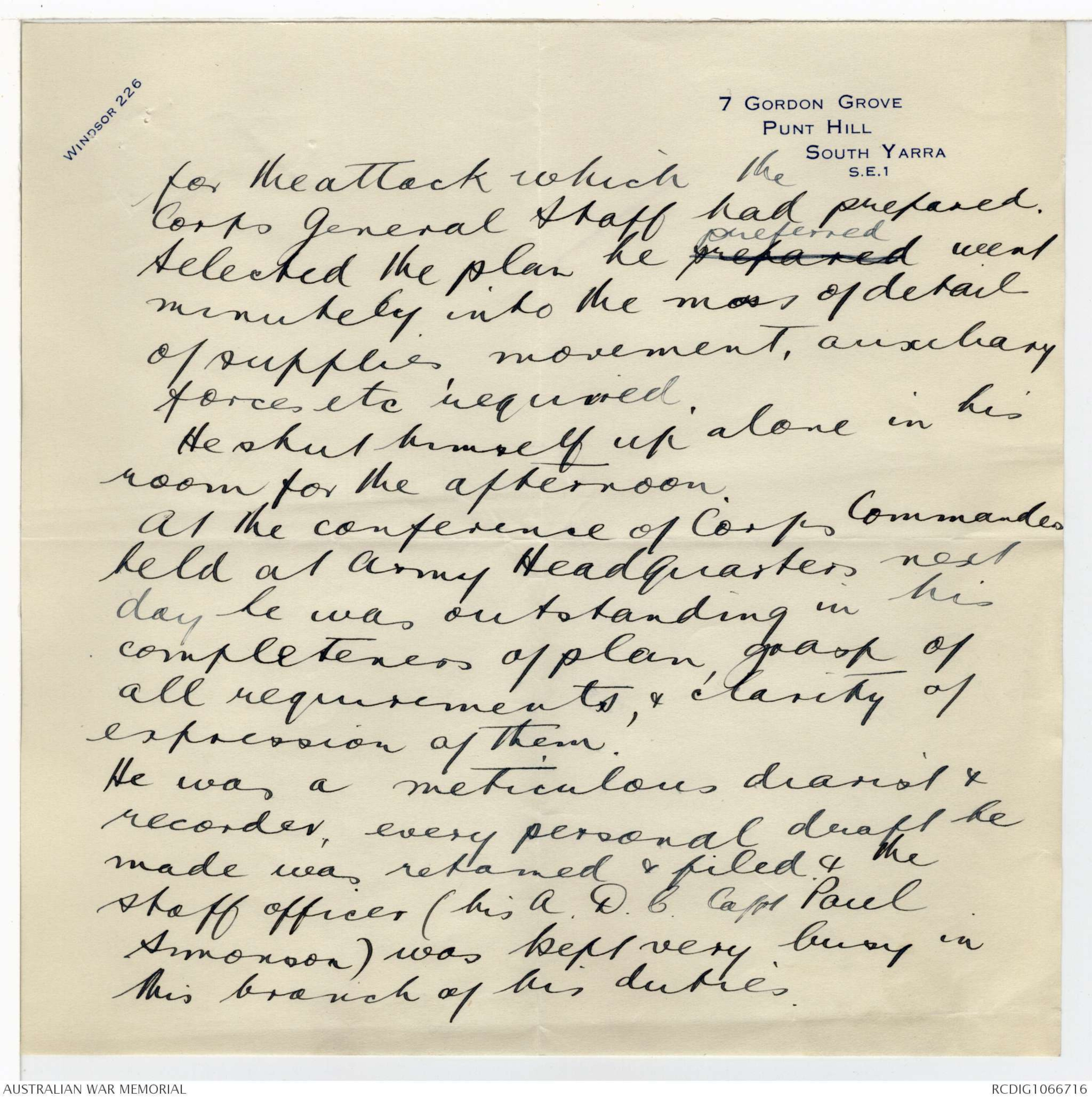
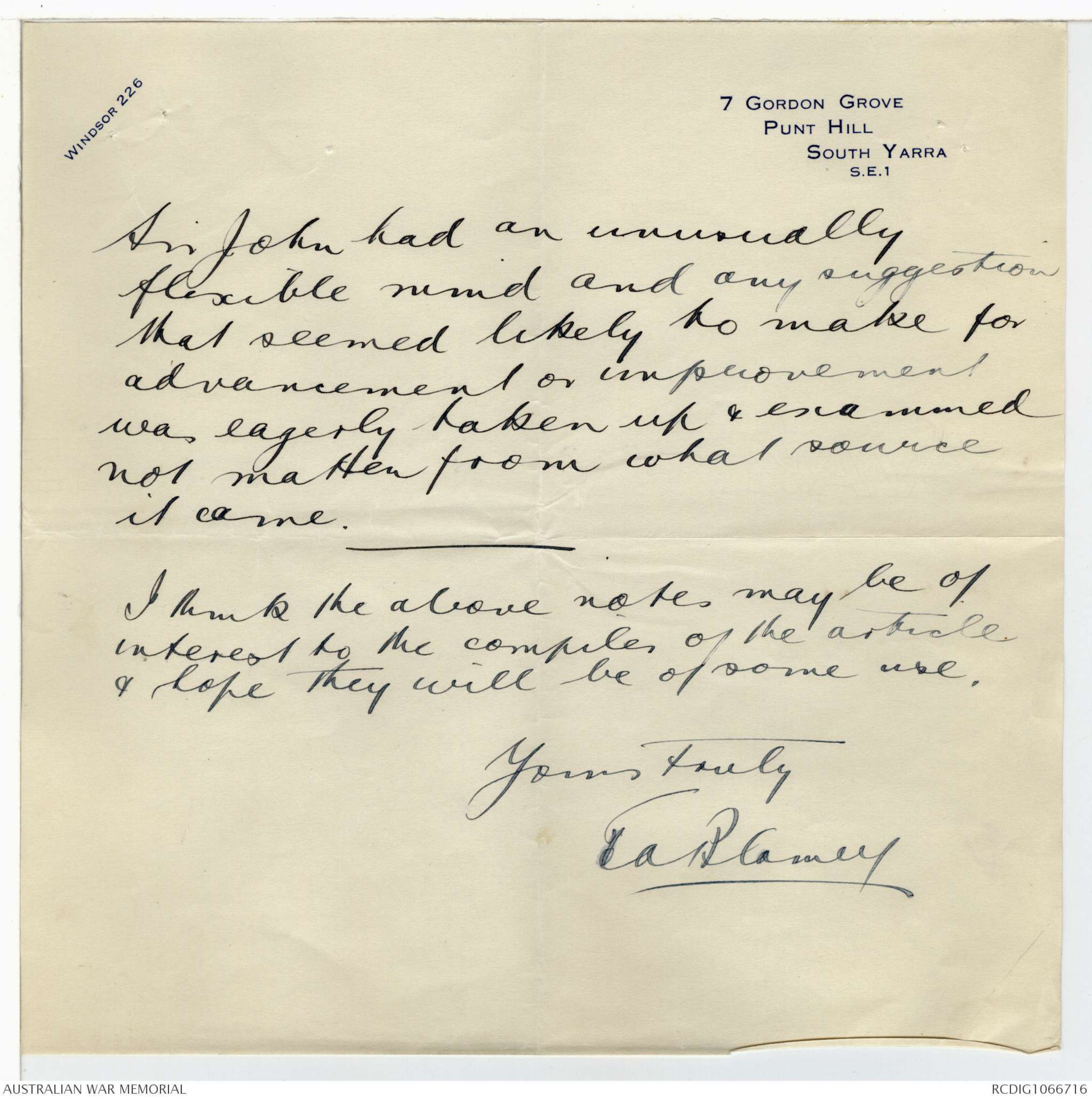
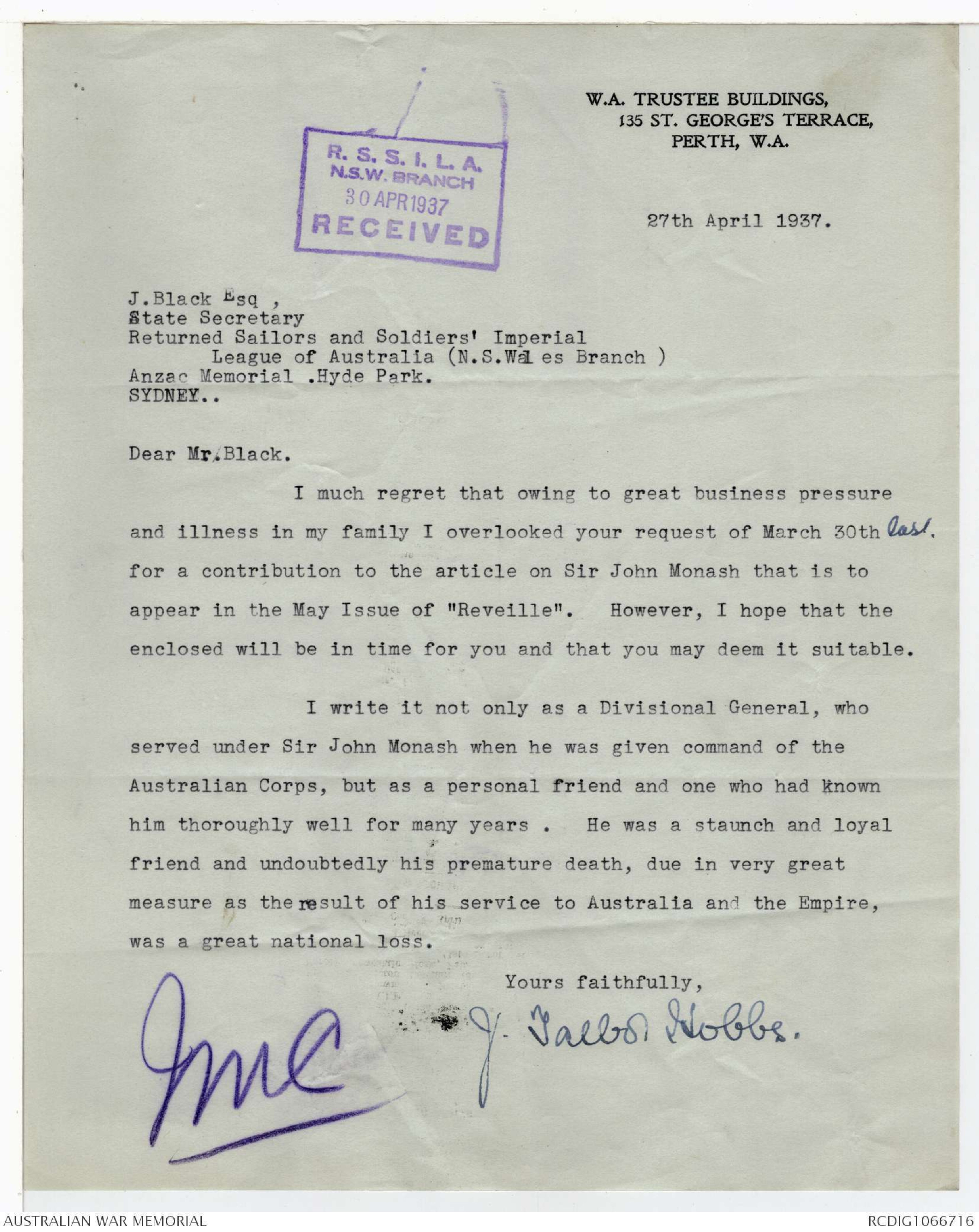
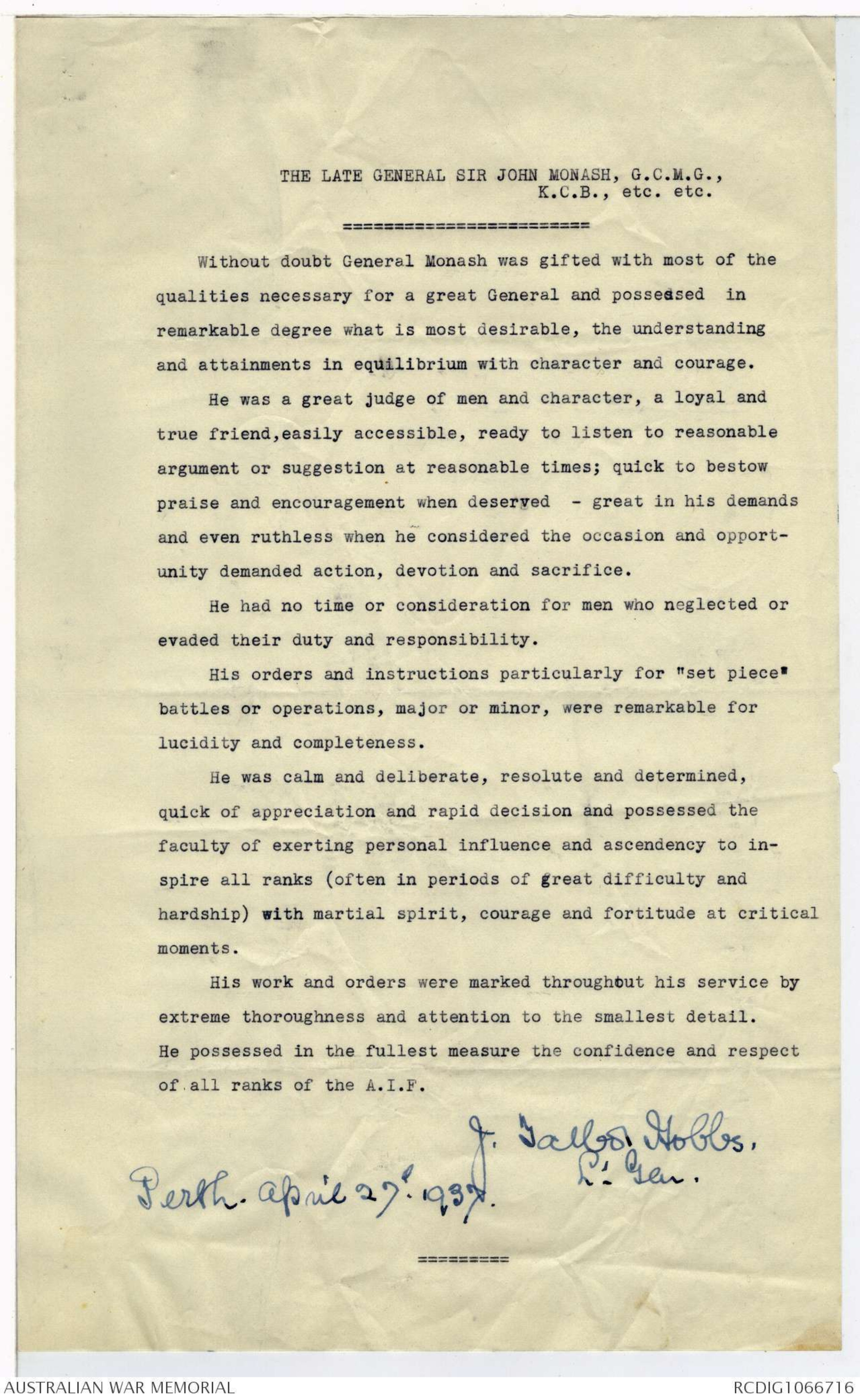
Maj Gen
Sir Brudenell White
538 COLLINS STREET.
MELBOURNE.
R.S.S.I.L.A.
N.S.W. BRANCH
-8 APR 1937
RECEIVED
Dear Mr. Black
I am sending to you in this some
notes about [[?]] Monash in the hope that they
may help you in the [[Confiltion?]] your
appreciation. They are just [[writling?]] in [[pards?]]
so that you may use them as you see fit. I
dto not wish my name mentioned in
connection [[inte?]] them
If other points occur to me later I will
send them over to you.
Theere is no more truth in the idea that Monash
[[?]] thought of in CinC then there is in the story
that I was "in the running" [[?]]
Yours sincerely Brudenell White
As is well known John Monash left Australia in
charge of the 4th Infantry Brigade which arrived in Egypt
some little time after the 1st Division formed its encampment
at Mena. The 4th Brigade was encamped at
and in due course was incorporated in the New Zealand Division
(which had then only two brigades) and was made the New Zealand
& Australian Division with under General Godley. General Monash had
as his brigade major J.P.McGlinn. Both were then men of unusual
bulk and as they frequently drove about together in the small
open car of those days they were promptly christened
"Tweedledum and Tweedledee"!!
On Gallipoli trenches were here and there connected
by short - and narrow - tunnels involving a crawl to negotiate
There was much joking at the inability of the two
large frames to squeeze through!
Monash was somewhat misplaced as a brigadier-
another example of the fact that men need to find their
correct niche to fulfil all that they are capable of. He had
not the physique, nor at the time, the youth and physical
vigour necessary for the intimate leading of troops involved
in a brigade command.
Whan circumstances necessitated the
organization and training of a third division in England it
2.
was wisely thought that the task suited Monash's qualities
better than a brigade command, and that it could be left to
time to shew whether in addition to organizing and training
he could handle a division in the field.
The long period of organization and training of the
third Division whilst strenuous enough in itself gave Monash
just the opportunity he needed of fitting himself - physically
and otherwise for the actual command. It also gave him an
easier war on the whole than many of the other higher Commanders.
When ultimately the third Division arrived in France
it was plain that provided his health stood the strain he would
shew himself much better fitted to command a division than a
brigade. For its first operation the third Division was put
into the battle of Messines as a unit of the Second Anzac Corps.
His command proved itself in that battle to be of as good
material as the other Australians divisions and that he himself was an
unusually good divisional commander.
3.
Monash and J. W. McCay were from the beginning of
their careers in keen competition with each other. Apparently
both at Scotch College and the University they spent their time
alternately one overtaking the other. This competition extended
into their military careers. Both had remarkable brains
and the concensus of opinion was that perhaps the difference in
volume and quality of grey matter lay with Monash. But McCay's
early military studies and the manner and result of them were
held by most people who had the qualifications to make a comparison,
a proof that of the two McCay was the abler soldier. This
would probably have been completely proved had the war been one
of movement. The time for planning and almost engineering
technique involved in stationary or trench warfare gave full
play to the qualities possessed in marked degree by Monash.
Monash had unquestionably the greater personality despite, an
unimpressive presence.
His brain like that of so many of his race was quick
to grasp and quick to learn; even if the knowledge was without
depth a hint of that defect was rarely made. His mental
energy was very remarkable, his brain always being ready to
work. He lost no opportunity of making a good impression
and his manner, was always confident. Gifted with an unusual
power of clear expression he was able to carry much weight in
conference.
[* McCay's miltary knowledge was much deeper
than Monash's. But Monash's "thinking [[machine?]]
& his power of acquiring knowledge in the moment
was better than McCay's*]
4.
Like all men of his nature he was vain but his
vanity was always under sufficient control to prevent him
from falling into weaknesses. His character was strong,
but whether sufficiently strong to stand firm when the
result would be to his detriment, must be left in some doubt.
The gossip that has grown up that Monash might have
come to high and even the highest place in the British Army
can be dismissed as moonshine. Ithas no foundation in fact.
It is clear that in appointing Monash to command the
ANLAC Corps in May 1918 General Birdwood acted with skill and
judgment. Monash was without doubt the man most fitted for
the task.
It would have been interesting to have tested his
command over a longer period; and it must not be overlooked
that Monash in 1918 took over an instrument perfected in its
job and he had before him a task in which Dame Fortune had set
a stage to suit him and Fate had already placed its black hand
on the German people and Army.
[* I am [[?]] in my mind
that if like [[Brudenel?]] he had been
subjected to [[?]] 4 years command
he would have failed. [[Brudenel? ]]performance
was truly remarkable.*]
WINDSOR 226
R.S.S.I.L.A
N.S.W BRANCH
13 APR 1937
RECEIVED
7 GORDON GROVE
PUNT HILL
SOUTH YARRA
S.E.1
12/4/37
Dear Sir
In reply to yours of 30th March
I fear that I am not very good at
recalling anecdotes of the kind you
ask for but can be of some help
otherwise.
I think Sir John had the most
highly trained mind that I had
to deal with in the war. He brought
to bear on any problem a most
intense concentration of thought
which produced a clarity in details
of plan not often met with.
Just prior to the attack of 8th August
he returned from England late in
the afternoon spent the whole of the
next morning with me in going
into details of the alternative plan
WINDSOR 226
7 GORDON GROVE
PUNT HILL
SOUTH YARRA
S.E.1
for the attack which the
Corks General Staff had prepared.
Selected the plan he prepared preferred [[went?]]
minutely into the mass of detail
of supplies movement, auxilary
forces etc required.
He shut himself up alone in his
room for the afternoon,
At the conference of Corps Commander
held at Army Headquarters next
day he was outstanding in his
completeness of plan, grasp of
all requirements, & clarity of
expression of them.
He was a meticulous diarist &
recorder, every personal draft he
made was retained & filed & the
shaff officer (his A.D.C. Capt Paul
Simonson) was kept very busy in
his branch of his duties.
WINDSOR 226
7 GORDON GROVE
PUNT HILL
SOUTH YARRA
S.E.1
Sir John had an unusually
flexible mind and any suggestion
that seemed likely to make for
advancement or implovement
was eagerly taken up & examined
not matter from what souce
it came.
I think the above notes may be of
interest to the compiles of the article
& hope they will be of some use
Yours truly
[[La Klamey?]]
R.S.S.I.L.A.
N.S.W. BRANCH
30 APR 1937
RECEIVED
W.A. TRUSTEE BULLDINGS,
135 ST. GEORGES TERRACE
PERTH, W.A.
27th April 1937.
J.Black Esq
State Secretary
Returned Sailors and Soldiers' Imperial
League of Australia (N.S. Wales Branch)
Anzac Memorial.Hyde Park.
SYDNEY..
Dear Mr Black.
I much regret that owing to great business pressure
and illness in my family I overlooked your request of March 30th last
for a contribution to the article on Sir John Monash that is to
appear in the May Issue of "Reveille". However, I hope that the
enclosed will be in time for you and that you may deem it suitable.
I write it not only as a Divisional General, who
served under Sir John Monash when he was given command of the
Australian Corps, but as a personal friend and one who had known
him thoroughly well for many years. He was a staunch and loyal
friend and undoubtedly his premature death, due in very great
measure as the result of his service to Australia and the Empire,
was a great national loss.
Yours faithfully,
J. Talbot Hobbs.
THE LATE GENERAL SIR JOHN MONASH, G.C.M.G.,
K.C.B., etc. etc.
Without doubt General Monash was gifted with most of the
qualities necessary for a great General and possessed in
remarkable degree what is most desirable, the understanding
and attainments in equilibrium with character and courage.
He was a great judge of men and character, a loyal and
true friend, easily accessible, ready to listen to reasonable
argument or suggestion at reasonable times; quick to bestow
praise and encouragement when deserved - great in his demands
and even ruthless when he considered the occasion and opportunity
demanded action, devotion and sacrifice.
He had no time or consideration for men who neglected or
evaded their duty and responsibility.
His orders and instructions particularly for "set piece"
battles or operations, major or minor, were remarkable for
lucidity and completeness.
He was calm and deliberate, resolute and determined,
quick of appreciation and rapid decision and possessed the
faculty of exerting personal influence and ascendency to inspire
all ranks (often in periods of great difficulty and
hardship) with martial spirit, courage and fortitude at critical
moments.
His work and orders were marked throughbut his service by
extreme thoroughness and attention to the smallest detail.
He possessed in the fullest measure the confidence and respect
of all ranks of the A.L.F.
J. Talbot Hobbs,
Lt. Gen.
Perth. April 27th. 1937.
 Sam scott
Sam scottThis transcription item is now locked to you for editing. To release the lock either Save your changes or Cancel.
This lock will be automatically released after 60 minutes of inactivity.